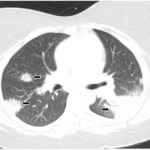“Are your fevers and muscle and joint pain any better with the meloxicam?” I asked.
“No, not really.” There was a pause. “So … you don’t know what’s wrong with me,” she said finally, clicking her purse shut.
Internally, I was taken aback by her lack of confidence. Her ongoing fevers and sweats were a puzzle, but I was confident I’d clarify the problem. “No. Not yet,” I answered. “May I reexamine you?”
The Reexamination
She held her hands out. “My fingers are killing me.” This time, I was sure that three of the knuckles on the right hand, and two on the left hand were swollen. When I asked her to flex the fingers to the palm, she was unable to make a full fist. Roughly speaking, the synovitis in her hands was symmetric, placing her within the realm of rheumatoid arthritis (RA).
One of my partners once remarked, “If you have a patient with an unusual prodrome you’ve never seen prior to the ultimate development of rheumatoid arthritis, you probably haven’t seen enough rheumatoid arthritis.” So although it’s true that the onset of RA after a cough and sore throat is unusual, that muscle aching is not where the pathology of RA resides and that fevers are uncommon, it’s also true that for each patient who ultimately settles into what all rheumatologists recognize as classic RA, there are early non-specific threads that, in retrospect, seemed to herald the disease.
“Could I have rheumatoid arthritis?” Mrs. N asked. “Larry asked me to ask you if that’s the problem.”
I hedged. “Your blood tests, a rheumatoid factor and a CCP antibody are negative. But they’re imperfect tests, particularly early in the disease. So yes, it’s possible that this is RA.” I felt vaguely embarrassed that she was the one to bring up a diagnosis that I make routinely. The hidden presence of Mrs. N’s husband, Dr. N, hovering in the background, only added to this concern. I straightened up in my chair and pulled my shoulders back. An inaudible click in my upper neck seemed to release an unwelcome pressure.
I pressed on. “When was the last time you had a mammogram, colonoscopy or Pap smear?”
“Last month my mammogram was fine. It’s been 20 years, I don’t know, maybe longer, since my last Pap.” She pursed her lips. “Colonoscopy? Never. I don’t know why you need to …”
“I need to tell you that when we’re considering a diagnosis of what we call sero-negative RA—meaning RA without positive blood tests—we have to consider a host of RA mimics. From time to time, we’ve seen cancer trigger fevers, muscle and joint pain. It’s important to exclude this, particularly because you’re losing weight, and we don’t have a clear cause. So,” I cleared my throat, “I’d like to set you up for an outpatient colonoscopy, and you need to see Dr. Hanson for an updated Pap and pelvic exam.”


